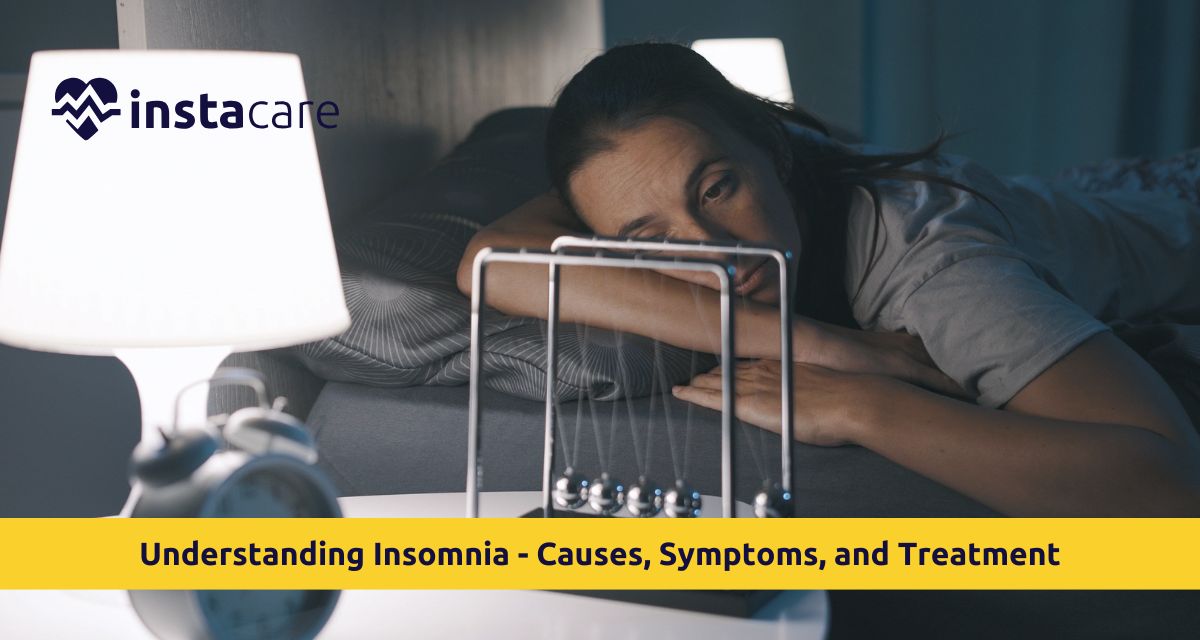It is a common sleep disorder that seems to be haunting so many people around the world. It refers to the condition when a person cannot sleep, stays awake at night, or wakes up too early and cannot go back to sleep. Obviously, health and wellness incorporate how a person studies insomnia; hence, this is precisely what brings this discussion to rounding up on causes, symptoms, and treatment modalities available for insomnia.
What is Insomnia?
Insomnia is a sleeping problem which occurs with involving its related effects, such as experiencing excessive tiredness during daytime, mood changes, and disturbances while performing regular functions of day-to-day life. It has Types of Insomnia, such as acute insomnia, chronic insomnia, etc. Acute insomnia occurs with symptoms related to discomfort for a few nights at a time when Insomnia sufferers experience stressful experiences or result in a significant life event, while chronic insomnia continues much longer and occurs probably for at least three nights a week for three months or more.
Some Causes of Insomnia
Such factors will include stress or
anxiety, caused mainly by bad lifestyle habits, disorganized or nonexistent sleep schedules, some currently ongoing diseases causing chronic pain or respiratory problems, and, finally, medications that counteract one's sleep. Knowledge of the causes of insomnia will help in making adequate treatment possible.
Signs of Insomnia
One can select an appropriate treatment for insomnia by recognizing the warning signs that appear. Sleeplessness at night, along with premature night awakenings leading to recurrent sleeplessness, functions as an initial symptom, while fatigue, short temper, and reduced concentration follow. These symptoms possess the power to create massive disruption in both personal daily responsibilities and overall health conditions.
What to Know About Acute Insomnia Vs Chronic Insomnia?
The distinction between acute and chronic insomnia is that acute insomnia can be provoked by stress or some event, chronic insomnia is chronic and likely to require grand intervention. Knowledge of this distinction may guide treatment options.
Chronic insomnia and acute insomnia are two classes of sleep disorders that differ from each other on the basis of their duration and causes.
The medical definition of chronic insomnia indicates that sleep concerns should develop multiple times each week during a three-month or longer duration. The total misery of chronic insomnia intensifies significantly for those with additional health problems such as anxiety, depression, or chronic pain because these elements produce exhaustion and irritability, and inattention while performing daily activities.
Acute insomnia, on the other hand, denotes non-lasting insomnia due to identifiable grossly adverse stressors, such as a sudden loss of job, marriage problems, or a significant life change. It leads to impaired sleep for a few days to several weeks, usually remitting as the stressors subside. But while giving transient upset and fatigue, an acute form of insomnia would be less likely to lead to such complications over a longer time frame than would chronic forms.
Recognising the differences is core to treatment consideration. Natural Treatments for Insomnia should include relaxation exercises or lifestyle modifications for acute insomniacs. These alternatives are not very productive in dealing with chronic variant types, which would be better suited for other treatments (psychotherapy) or pharmacological intervention if required for the underlying causes.
How to Treat Insomnia?
There are many ways to treat Insomnia, including cognitive behavioral therapy (CBT-I) to treat the thought patterns and behaviors that underlie sleep troubles. Some may consider insomnia medications, such as prescription sleep medicines or OTC medicines ordered by physicians. Natural means involve herbal therapy for initiating sleep, such as melatonin and valerian.
Sleep Hygiene Methods to Keep for Insomnia
Good sleep hygiene greatly increases the quality of sleep, especially with regard to insomnia. Secondly, set up a habit of getting to sleep and waking up at about the same hours most days so as to create a proper sleep routine. The sleep environment has to be very comfortable, dark, quiet, and cold. Also, cut down on beverages high in caffeine and alcohol, especially before bedtime, and practice relaxation techniques like meditation or deep breathing just before sleeping.
Insomnia and Its Relation with Various Factors
Insomnia & Anxiety
A very tight bond exists between insomnia and anxiety. Anxiety keeps one awake and prevents one from relaxing, creating the cycle wherein an increase in Insomnia Symptoms and anxiety is due to a lack of sleep. However, it is necessary to treat the two conditions side by side effectively.
Insomnia and Depression
Also, there is a co-occurrence of those two, Insomnia and Depression. Sleep problems may aggravate depression, which means treating both conditions will be a good idea. One can use therapy and medication to treat both conditions to make the overall mental health better.
Insomnia and Sleep Disorders
Disrupt sleep and may cause insomnia: Insomnia and Sleep Disorders. Conditions include narcolepsy, restless leg syndrome, and sleep apnea, among others. Once correctly diagnosed, these conditions will be treated accordingly, and insomnia will be adequately handled.
How to Get Sleep with Insomnia?
Some techniques for Falling Asleep with Insomnia include reducing screen exposure hours before bed, having some kind of relaxing routine before going to bed, and practicing some form of relaxation, such as
yoga or meditation.
Effects of Insomnia on Health
Insomnia has its effect on health, and it may prove very serious. Chronic insomnia is considered to come with several health threats, chronic conditions like heart disease and diabetes being the few; cognitive and memory function impairment is significantly disturbed, as well as susceptibility to mental health disorders is increased considerably. All in all, it is essential to ameliorate the case of insomnia as a prerequisite to good health.
Conclusion
Insomnia occurs widely in society as it degrades essential aspects of life, both physically and behaviorally. People need to learn all components of insomnia, including reasons behind it and ways to detect symptoms, as well as treatment choices for effectively bringing sounder sleep patterns. Users across the world need to address insomnia because it directly improves health outcomes regardless of behavioral or therapeutic, or pharmacological intervention.
Please book an appointment with the
Best Psychologist in Lahore, Karachi, Islamabad, and all major cities of Pakistan through
InstaCare, or call our helpline at 03171777509 to find a verified doctor for your disease.












